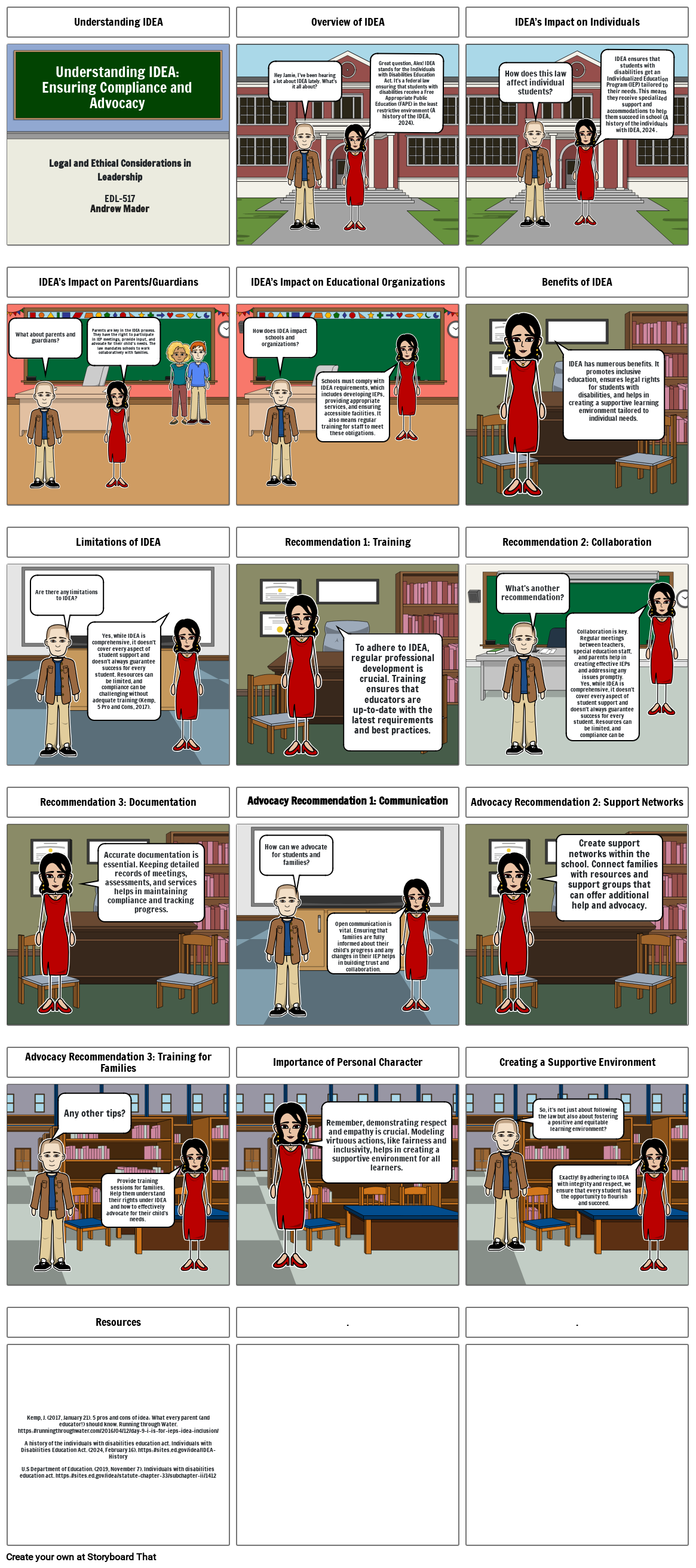Understanding IDEA: Ensuring Compliance and Advocacy

Montāžas Teksta
- Slidkalniņš: 1
- Understanding IDEA
- Understanding IDEA: Ensuring Compliance and Advocacy
- Legal and Ethical Considerations in LeadershipEDL-517Andrew Mader
- Slidkalniņš: 2
- Overview of IDEA
- Great question, Alex! IDEA stands for the Individuals with Disabilities Education Act. It’s a federal law ensuring that students with disabilities receive a Free Appropriate Public Education (FAPE) in the least restrictive environment (A history of the IDEA, 2024).
- Hey Jamie, I’ve been hearing a lot about IDEA lately. What’s it all about?
- Slidkalniņš: 3
- IDEA’s Impact on Individuals
- IDEA ensures that students with disabilities get an Individualized Education Program (IEP) tailored to their needs. This means they receive specialized support and accommodations to help them succeed in school (A history of the individuals with IDEA, 2024 .
- How does this law affect individual students?
- Slidkalniņš: 4
- IDEA’s Impact on Parents/Guardians
- Parents are key in the IDEA process. They have the right to participate in IEP meetings, provide input, and advocate for their child's needs. The law mandates schools to work collaboratively with families.
- What about parents and guardians?
- Slidkalniņš: 5
- IDEA’s Impact on Educational Organizations
- How does IDEA impact schools and organizations?
- Schools must comply with IDEA requirements, which includes developing IEPs, providing appropriate services, and ensuring accessible facilities. It also means regular training for staff to meet these obligations.
- Slidkalniņš: 6
- Benefits of IDEA
- Slidkalniņš: 7
- Limitations of IDEA
- Are there any limitations to IDEA?
- Yes, while IDEA is comprehensive, it doesn’t cover every aspect of student support and doesn’t always guarantee success for every student. Resources can be limited, and compliance can be challenging withoutadequate training (Kemp, 5 Pro and Cons, 2017).
- Slidkalniņš: 8
- Recommendation 1: Training
- Slidkalniņš: 9
- Recommendation 2: Collaboration
- What’s another recommendation?
- Collaboration is key. Regular meetings between teachers, special education staff, and parents help in creating effective IEPs and addressing any issues promptly.Yes, while IDEA is comprehensive, it doesn’t cover every aspect of student support and doesn’t always guarantee success for every student. Resources can be limited, and compliance can be challenging without adequate training.
- Slidkalniņš: 10
- Recommendation 3: Documentation
- Accurate documentation is essential. Keeping detailed records of meetings, assessments, and services helps in maintaining compliance and tracking progress.
- Slidkalniņš: 11
- Advocacy Recommendation 1: Communication
- How can we advocate for students and families?
- Open communication is vital. Ensuring that families are fully informed about their child’s progress and any changes in their IEP helps in building trust and collaboration.
- Slidkalniņš: 12
- Advocacy Recommendation 2: Support Networks
- Create support networks within the school. Connect families with resources and support groups that can offer additional help and advocacy.
- Slidkalniņš: 13
- Advocacy Recommendation 3: Training for Families
- Any other tips?
- Provide training sessions for families. Help them understand their rights under IDEA and how to effectively advocate for their child’s needs.
- Slidkalniņš: 14
- Importance of Personal Character
- Remember, demonstrating respect and empathy is crucial. Modeling virtuous actions, like fairness and inclusivity, helps in creating a supportive environment for all learners.
- Slidkalniņš: 15
- Creating a Supportive Environment
- So, it’s not just about following the law but also about fostering a positive and equitable learning environment?
- Exactly! By adhering to IDEA with integrity and respect, we ensure that every student has the opportunity to flourish and succeed.
- Slidkalniņš: 16
- Resources
- Kemp, J. (2017, January 21). 5 pros and cons of idea: What every parent (and educator!) should know. Running through Water. https://runningthroughwater.com/2016/04/12/day-9-i-is-for-ieps-idea-inclusion/A history of the individuals with disabilities education act. Individuals with Disabilities Education Act. (2024, February 16). https://sites.ed.gov/idea/IDEA-HistoryU.S Department of Education. (2019, November 7). Individuals with disabilities education act. https://sites.ed.gov/idea/statute-chapter-33/subchapter-ii/1412
- Slidkalniņš: 17
- .
- Slidkalniņš: 18
- .
- Slidkalniņš: 0
- IDEA has numerous benefits. It promotes inclusive education, ensures legal rights for students with disabilities, and helps in creating a supportive learning environment tailored to individual needs.
- To adhere to IDEA, regular professional development is crucial. Training ensures that educators are up-to-date with the latest requirements and best practices.
Izveidoti vairāk nekā 30 miljoni stāstu shēmu

